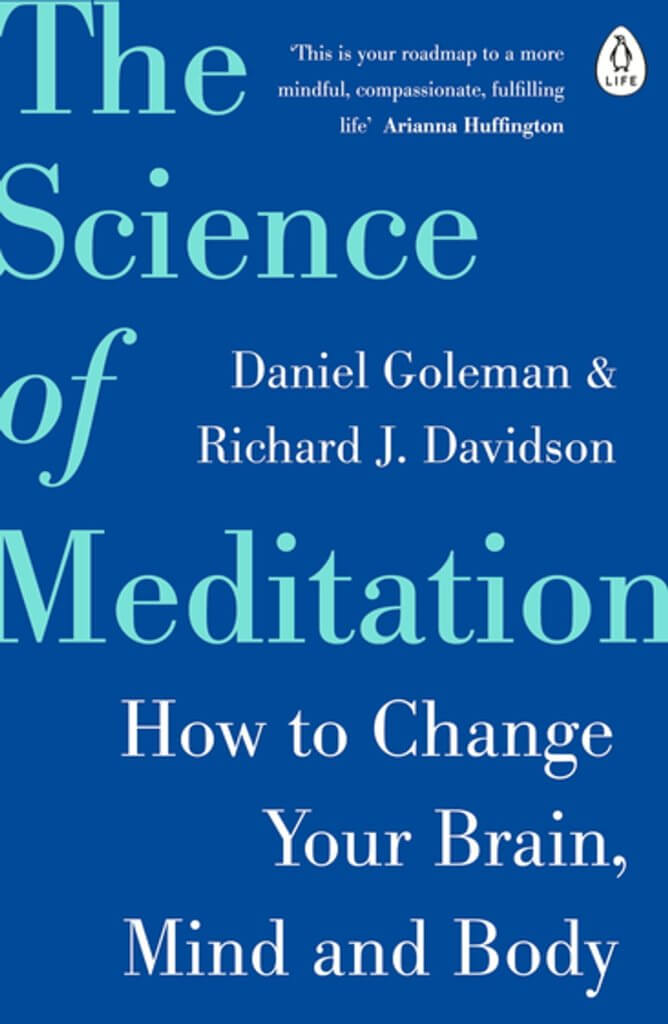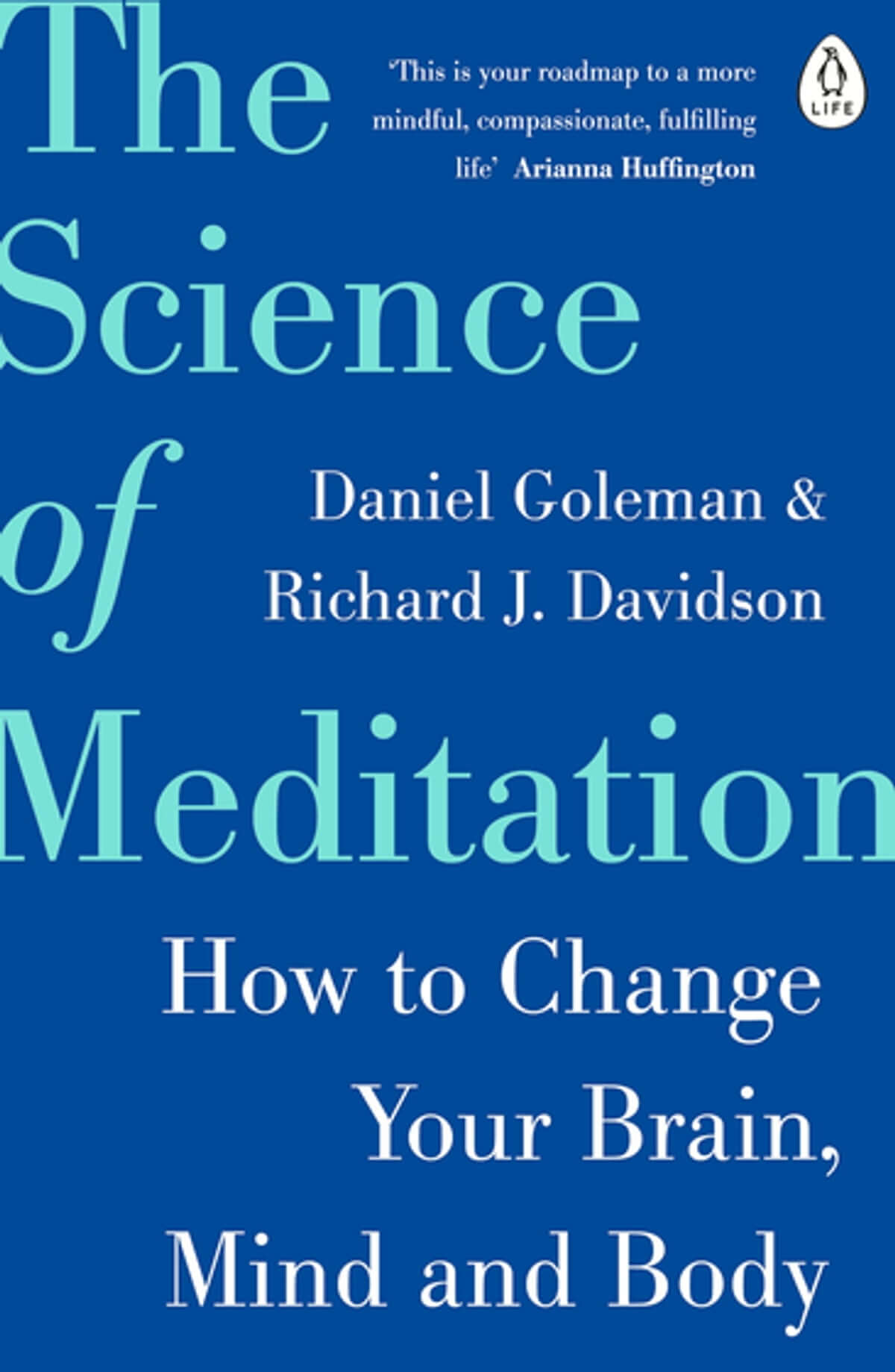
Are you seeking ways to reshape your mental state and enhance overall well-being? “The Science of Meditation: How to Change Your Brain, Mind, and Body” by Richard Goleman and Daniel Davidson may be the guide you’ve been looking for.
This blog post will delve into the fascinating findings from this acclaimed book, shedding light on how meditation can transform your mind, body, and brain. Ready for a compelling journey through mindfulness science? Let’s dive in!
Key Takeaways
- “The Science of Meditation” by Richard Goleman and Daniel Davidson explores how meditation can positively impact the brain, mental well-being, and physical health.
- Research shows that regular meditation can change the structure and function of the brain, leading to improved cognitive abilities like memory and problem-solving.
- Practicing mindfulness through meditation can reduce stress, increase feelings of calmness, improve emotional well-being, and develop greater self-awareness.
- Regular meditation practice can also have physical benefits such as reducing stress levels, lowering blood pressure, boosting the immune system, helping with pain management, and improving sleep quality.
About the Authors
Richard Goleman is a renowned psychologist and author known for his books on emotional intelligence. He has written extensively about the intersection of science and mindfulness.
Daniel Davidson is a neuroscientist specializing in the study of meditation and its effects on the brain. He has conducted groundbreaking research on how meditation can change neural pathways and improve mental well-being.
These two experts have come together to write “The Science of Meditation: How to Change Your Brain, Mind, and Body,” a book that delves into the scientific evidence behind meditation’s transformative power.
Daniel Goleman
Daniel Goleman is a well-known writer. He has written a lot about the brain and how it works. This book, “The Science of Meditation: How to Change Your Brain, Mind and Body,” is one of his famous books.
It speaks about meditation and its effects on us. You can get this book online or in stores for $20.39. Goleman shares new findings on how our brain reacts to mindfulness in this book.
His work shows that our brains can change with mindful practices like meditation.
Richard J. Davidson
Richard J. Davidson is one of the authors of “The Science of Meditation: How to Change Your Brain, Mind and Body.” He is a renowned researcher in the field of neuroscience and has dedicated his career to understanding how meditation can impact our well-being.
With over forty years of experience, Davidson presents new research findings on the effects of meditation on the brain. His expertise and knowledge contribute to the book’s exploration of whether meditation can bring about enduring changes to our minds, brains, and bodies.
Along with Daniel Goleman, Davidson aims to provide practical applications for incorporating meditation into daily life and choosing the right meditation practice for optimal benefits.
Overview of the Book
In “The Science of Meditation: How to Change Your Brain, Mind and Body” by Richard Goleman and Daniel Davidson, the authors delve into the benefits of meditation and explore how it can transform our brain, mind, and body.
The benefits of meditation
Meditation has numerous benefits for your brain, mind, and body. According to “The Science of Meditation” by Richard Goleman and Daniel Davidson, meditation can help improve your mental and emotional well-being.
It can also have positive effects on your physical health. Scientific research shows that regular meditation practice can reduce stress, lower blood pressure, strengthen the immune system, and improve sleep quality.
Additionally, meditation can enhance focus and concentration, increase self-awareness and mindfulness, and promote a sense of inner calm and peace. By incorporating meditation into your daily life, you can experience these transformative benefits for yourself.
Combining science and mindfulness
In “The Science of Meditation: How to Change Your Brain, Mind and Body,” authors Richard Goleman and Daniel Davidson explore the connection between science and mindfulness. They present new research findings on how meditation affects the brain, mind, and body.
The book highlights the capacity of the brain to transform under the influence of mindfulness. Through their exploration of scientific evidence, Goleman and Davidson aim to show that enduring changes can occur in the mind, brain, and body through regular meditation practice.
This combination of science and mindfulness provides a comprehensive understanding of how meditation can benefit individuals in various aspects of their lives.
Key Findings from the Book
The Science of Meditation reveals groundbreaking findings on how meditation can positively impact the brain, mental and emotional well-being, and physical health.
The impact of meditation on the brain
Meditation has a positive impact on the brain. Research discussed in “The Science of Meditation” shows that regular meditation can change the structure and function of the brain. It increases activity in areas associated with focus and attention, while decreasing activity in regions linked to stress and anxiety.
This leads to improved cognitive abilities like memory, decision-making, and problem-solving. The book also explores how meditation promotes neuroplasticity, which is the brain’s ability to adapt and change throughout life.
These findings suggest that practicing meditation regularly can help managers and individuals in self-development enhance their overall brain health and functioning.
Changes in mental and emotional well-being
The book “The Science of Meditation” explores how meditation can bring about changes in mental and emotional well-being. Research findings presented by the authors suggest that practicing mindfulness and other meditation techniques can have a positive impact on our mental state, reducing stress and increasing feelings of calmness and contentment.
It is argued that regular meditation can also improve emotional well-being, helping individuals to better manage their emotions and develop greater self-awareness. The book delves into the neuroscience behind these changes, highlighting the potential for long-lasting transformations in the mind and body through consistent meditation practice.
Physical benefits of meditation
Meditation not only improves your mental state but also offers physical benefits. According to “The Science of Meditation” by Richard Goleman and Daniel Davidson, regular meditation practice can reduce stress levels, lower blood pressure, and boost the immune system.
It can also help with pain management and improve sleep quality. These physical benefits are a result of the mind-body connection that meditation promotes. By calming the mind and practicing mindful awareness, you can experience positive changes in your body as well.
So, incorporating meditation into your daily routine can have both mental and physical advantages for your overall well-being.
Practical Applications of the Science of Meditation
Incorporate meditation into your daily life with tips and guidance from the experts, and learn how to choose the right meditation practice for you.
Tips for incorporating meditation into daily life
To incorporate meditation into your daily life, start by setting aside a specific time each day for practice. Find a quiet and comfortable space where you won’t be interrupted. Begin with just a few minutes of deep breathing or mindfulness exercises.
As you become more comfortable, gradually increase the duration of your sessions. Experiment with different types of meditation techniques, such as Vipassana or chakra meditation, to find what works best for you.
Remember that consistency is key – even short daily meditations can have significant benefits for your mental and emotional well-being. By making meditation a regular part of your routine, you can experience the transformative effects it has on your brain, mind, and body.
Choosing the right meditation practice
To choose the right meditation practice, you need to consider what works best for you. There are various techniques like Vipassana and chakra meditation that can help you achieve different goals.
Some practices focus on mindfulness and breathing exercises, while others explore the mind-body connection. It’s important to find a technique that resonates with you and fits into your daily life.
Experiment with different methods until you find one that brings calmness and clarity to your mind. Remember, there is no one-size-fits-all approach to meditation, so trust your intuition and find what works best for you.
Conclusion
In conclusion, “The Science of Meditation” by Richard Goleman and Daniel Davidson explores the fascinating effects of meditation on the brain, mind, and body. Through their research findings, they shed light on how meditation can bring about lasting changes in our mental and emotional well-being.
With practical tips for incorporating meditation into daily life, this book offers valuable insights into harnessing the power of mindfulness to transform ourselves from within.”.
FAQs
1. What is the book “The Science of Meditation: How to Change Your Brain, Mind and Body” about?
This book by Richard Goleman and Daniel Davidson talks about transforming the brain with altered traits through practical meditation.
2. How does this book relate to the neuroscience of meditation?
It shares insights on mindfulness practices that show how they lead to brain plasticity. It also covers cognitive benefits of meditation based on contemplative neuroscience.
3. Can reading this book improve emotional wellbeing?
Yes, it can. The authors explain the mind-body connection in detail. They also talk about reducing stress using different styles of meditation.
4. Does “The Science of Meditation” offer ways to change your mind and body?
Absolutely! This work guides readers on practicing effective forms of meditation that may bring changes to both their mind and body over time.





